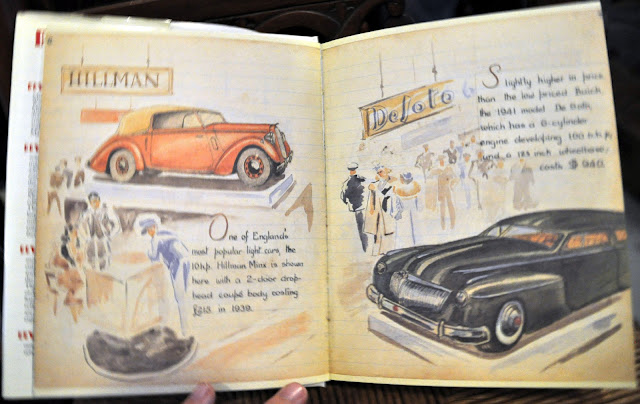A facsimile reproduction of the collection of motoring magazines, each drawn and scripted by hand by POW's in Muhlberg, Germany during the 2nd world war. Motoring adventures before the war, road tests of cars and motor cycles, a speculative 1944 motor show, advertisements, editorial comment and even a letters page nostalgically reflect pre-war life. Bikes and cars that are no longer produced, but with names that are legend are all recalled. The book is filled with humour, compassion, enthusiasm and authority. the drawings and sketches are both graphic and realistic, the text full of wit and highly credible.
Flywheel: Memories of the Open Road by one Tom Swallow and members of the Muhlberg Motor Club. Remarkable as it may seem, Flywheel is a compilation of reprinted motoring articles collated by founding editor Swallow and produced by prisoners-of-war in Stalag IVB in Germany from 1944-45.
In peacetime, Englishman Swallow was a keen car and motorcycle enthusiast and had teamed up at Stalag IVB with another PoW, a Durban journalist called Pat Harrington-Johnson. They decided, in an attempt to raise the prisoners’ morale, to publish a motoring magazine for them
Stealth was the name of the game,” Harrington-Johnson said. “We collected all the exercise books we could find and spread the word around to all the chaps who had a motoring yarn to tell so they could contribute. Ink was something we most certainly didn’t have – but of ingenuity we had lots!
“Stolen materials such as quinine from the medical room provided the dye, tinted to suit, of course.”
“Sticking articles on the pages difficult - excess fermented millet soup took care of that little problem.
“Just one copy per issue was produced and circulated among members of the Muhlberg Motor Club - the Jerries never had a clue what we were up to.”
Flywheel production was taken seriously. It had a diesel expert, a sports-car guru, a bike fundi, even a circulation manager.
Flywheel produced 11 editions. The group went their separate ways after the end of the war, Swallow to become a well-known motorcycle dealer in the British Midlands in due course.
He kept in touch with his old muckers from Australia, Canada, Rhodesia and South Africa.
Entirely hand-printed and illustrated with tinted pen-and-ink drawings on a few sheets of cheap, lined notebook paper, a single copy of each of the 10 “issues” was passed from hand to hand among enthusiasts in the camp, entertaining them with imaginary road tests, motor show reports, technical articles, race reports, motoring memories, cartoons, and even used car advertisements and letters to the editor. Most articles were created from memory, and a few were gleaned from magazines in Red Cross packages or letters. The finest of them are reproduced here, complete with faded paper and stains to show age. Of course, even though the original publication quality was almost non-existent, this hardbound book presents the reprints on quality paper in full, though accurately faded, color.
Judging by the writing, artwork, design, editing, and even penmanship, the original Flywheel staff’s professionalism is as evident as its enthusiasm, knowledge, and craftiness. To create each issue of this fascinating “magazine”, the prisoners had to beg, borrow, and steal such essentials as paper, ink, and pens. To stick illustrations to its pages, they made glue from rotting soup. To color the drawings, they liquefied their own quinine pills. Yet the content is superb, and the magazine even had an appropriate motto, “To Keep the Works Going Round on the Idle Strokes.” While there are references to “when we get home”, the general editorial approach is to mimic an actual magazine, as if the readers already were at home. Appropriately, proceeds from the sale of this book were donated to the Red Cross, which had helped keep the staff alive.
http://speedreaders.info/60-flywheel_memories_of_the_open_road_bytom/
http://www.wheels24.co.za/BikesQuads/Blast-from-the-wartime-past-20110504

















0 komentar: